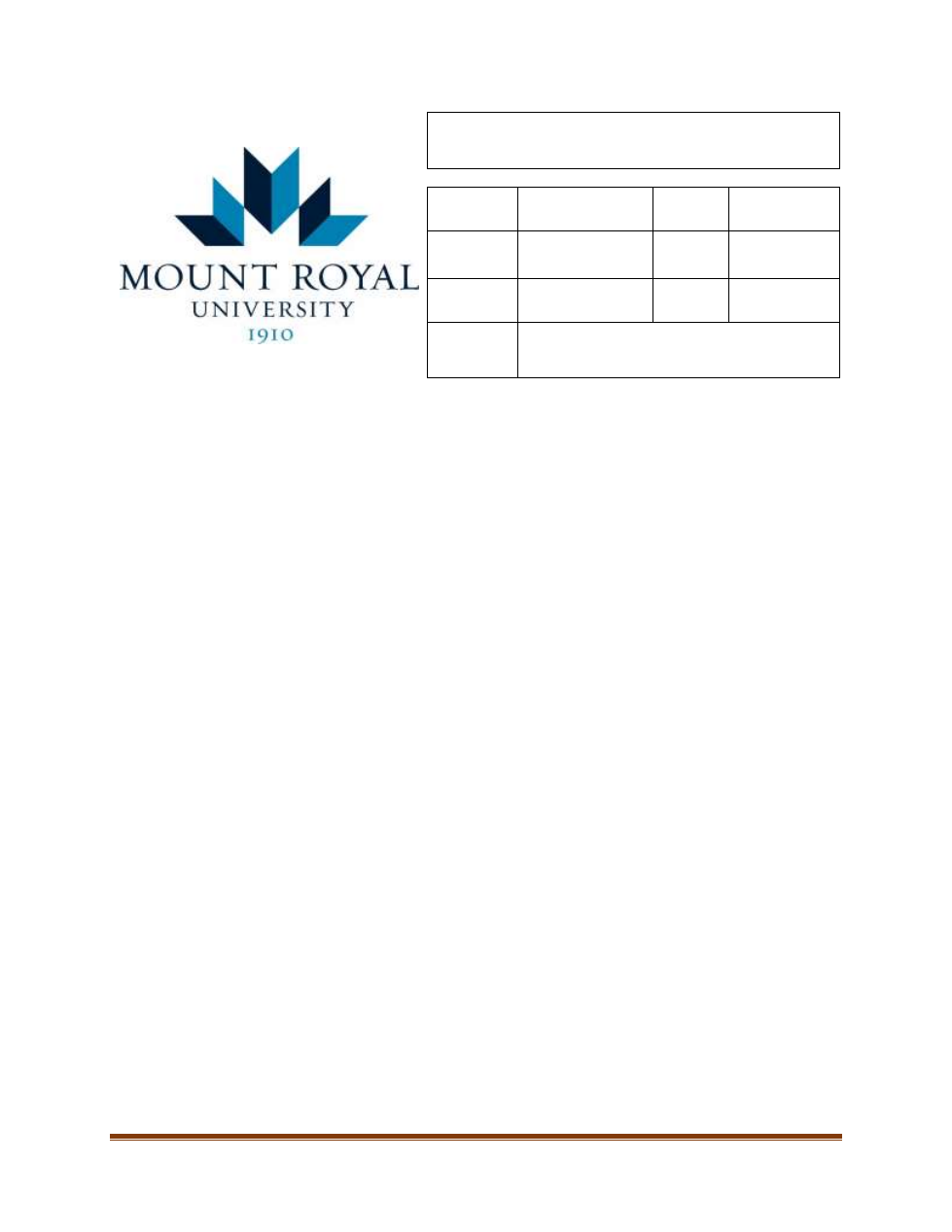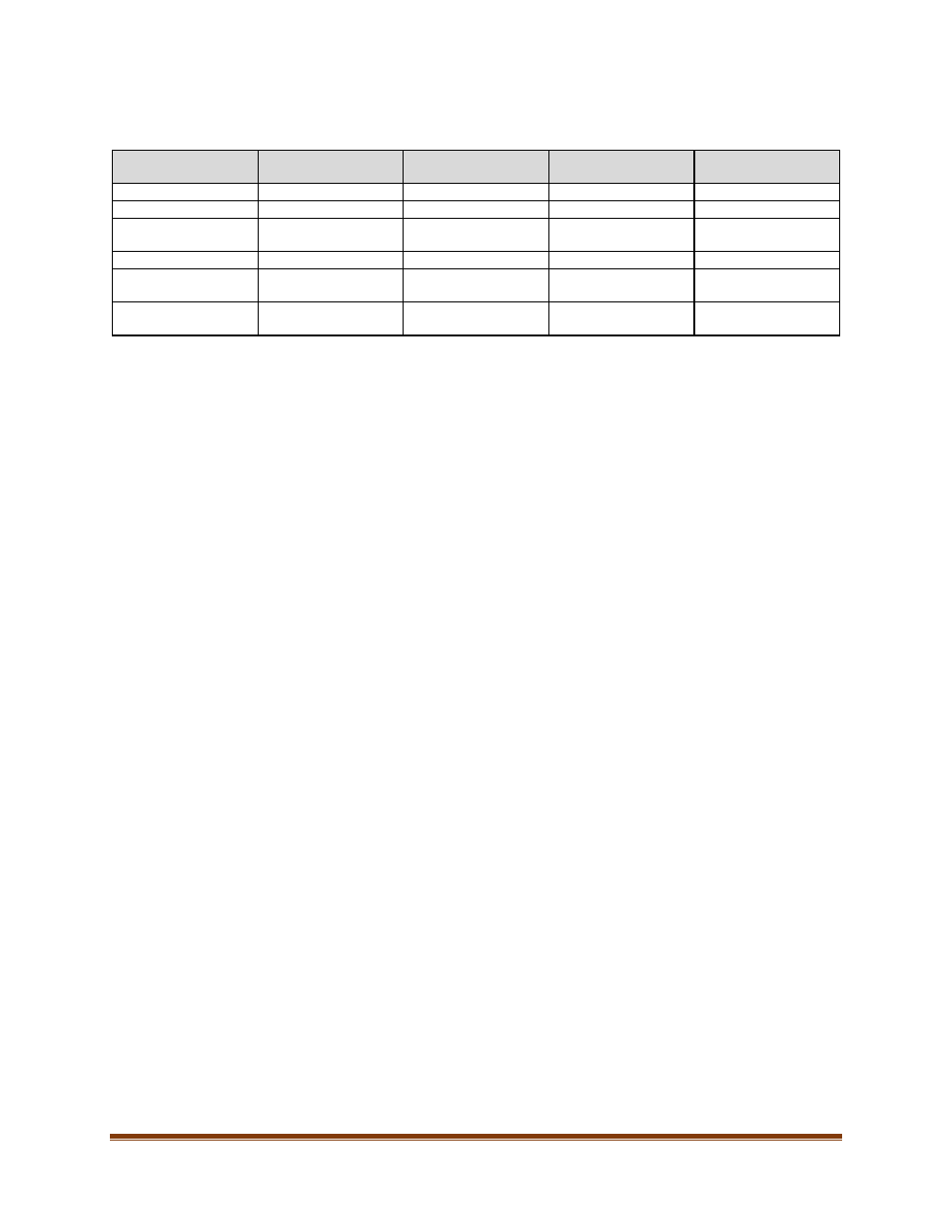
Academic Accommodation for Students Experiencing Disabilities Policy – April 7, 2014
Page 1 of 14
ACADEMIC ACCOMMODATION FOR STUDENTS
EXPERIENCING DISABILITIES POLICY
Policy Type:
Management
Initially
Approved:
December 11,
2006
Policy
Sponsor:
Vice-President,
Students
Last
Revised:
April 7, 2014
Primary
Contact:
AVP, Student
Experience and
Success
Review
Scheduled:
September 2025
Approver:
Board of Governors
A.
PURPOSE
Mount Royal celebrates diversity and welcomes the contributions, experiences and full participation
of Students Experiencing Disabilities as valued members of our community. Higher education is
the gateway to the workplace and community for our students; therefore, it is essential that the
learning environment at Mount Royal be accessible to all members of the community. Mount Royal
is committed to cultivating a Universally Accessible environment for all of its communities through
the removal and prevention of accessibility-related Barriers. This Policy aims to foster diversity,
inclusiveness and student success by ensuring that Students Experiencing Disabilities receive
equal opportunities for academic success and personal development at Mount Royal.
In accordance with the Alberta Human Rights Act ("the Act"), and Mount Royal’s Human Rights
Policy, Mount Royal will promote and protect the rights and dignity of Students Experiencing
Disabilities and will create and maintain a safe, respectful and supportive learning environment that
is free from Discrimination and harassment. Mount Royal recognizes its legal duty to provide
Reasonable Accommodation to Students Experiencing Disabilities, that this duty arises from
human rights legislation, and that failure to provide Reasonable Accommodation to a student with
a documented Disability may amount to Discrimination under the Act.
B.
SCOPE
This Policy applies to all Students Experiencing Disabilities enrolled at Mount Royal, as well as to
all those responsible for its implementation. All faculty and faculty/instructional staff, administrative
and support staff share Mount Royal’s legal responsibility under the Act to accommodate Students
Experiencing Disabilities.
For Accommodations other than Academic Accommodations for Students Experiencing
Disabilities, please refer to Mount Royal's Human Rights Policy or contact Access and Inclusion
Services.
C.
POLICY STATEMENT
1.
PRINCIPLES
1.1
Mount Royal recognizes the rights of Students Experiencing Disabilities who are
academically qualified to participate fully in the life of the institution.

Academic Accommodation for Students Experiencing Disabilities Policy – April 7, 2014
Page 2 of 14
1.2
Mount Royal promotes awareness, advocacy and learning partnerships amongst
the whole of the Mount Royal community. In recognition of the diverse population
it serves, Mount Royal is committed to providing a respectful, inclusive, Barrier-
free and Universally Accessible learning environment within the limits of Undue
Hardship.
1.3
In recognition that ability is diverse in kind and degree, Mount Royal will adapt its
services and programs to accommodate the needs of individual students, in
accordance with the requirements of the Act.
1.4
Provision of Academic Accommodation shall not lower the academic standards of
the University. Academic Accommodation shall not remove the need for evaluation
and the need to meet essential learning outcomes.
1.5
Students Experiencing Disabilities will meet the same academic requirements and
standards as all students, although the manner by which Students Experiencing
Disabilities meet these may vary.
1.6
Academic integrity, as defined by the Code of Student Conduct Policy, will be
upheld by those providing and receiving Academic Accommodation.
1.7
Delegation of authority for Academic Accommodation decisions is based on:
a.
The type (Modification; Substitution; Waiver; Degree Notwithstanding a
Deficiency) of Accommodation being sought; and
b.
The level of Accommodation being sought (Course; program; University).
1.8
Mount Royal stresses the development of self-advocacy and independence of
Students Experiencing Disabilities. Students are their own best advocates and a
reasonable measure of self-reliance is necessary for academic success. Students
requesting Academic Accommodation must take the initiative to inform the
institution of their needs at the beginning of the term they pursue their studies with
the same diligence required of all students and accept responsibility for the role
that they play in achieving their goals.
1.9
Notwithstanding the above, there may be times when self-advocacy by students in
the process of securing Academic Accommodations is not a reasonable
expectation. Factors that may affect a student's ability to advocate for themselves
include:
(a)
The nature of the Disability may make it difficult for a student to be aware
of the need for Accommodation and/or to participate in the design and
implementation of the Accommodation;
(b)
The pervasive and persistent stigma associated with requiring Academic
Accommodation(s) and/or certain Disabilities;
(c)
The existing power imbalance between students and University personnel,
including faculty/instructional staff members and others involved in the
implementation of Academic Accommodation(s).
Students should be aware of the support services available to them on campus,
including the services of the Students’ Association of Mount Royal University.

Academic Accommodation for Students Experiencing Disabilities Policy – April 7, 2014
Page 3 of 14
1.10
While Students Experiencing Disabilities are encouraged to share information
regarding their Accommodations with faculty/instructional staff and other
University personnel that would play a role in facilitating their Accommodations,
such information can only be released in accordance with the Act, the Freedom of
Information and Privacy Act and the Health Information Act.
1.11
Mount Royal recognizes the variety of rights enjoyed by members of the campus
community, including academic freedom. Notwithstanding the range of values and
interests held by members of our community, international conventions, the
Canadian Charter of Rights and Freedoms, provincial human rights legislation and
legal decisions all recognize the paramount importance and unique status of
human rights, including the duty to accommodate Students Experiencing
Disabilities. In all cases, the rights of individuals as protected by the Act, the Mount
Royal Human Rights Policy and/or this Policy are superordinate to other rights and
freedoms in the campus community. Academic freedom implies in no way the right
to engage in any action that demeans the freedom or dignity of other individuals in
the campus community.
(12)
Respect for all members of the Mount Royal community will be upheld at all times.
Discrimination and harassment will not be tolerated.
(13)
In accordance with relevant legislation and tribunal and court decisions, Mount
Royal recognizes our responsibility to justify the academic standards we use to
deny Academic Accommodations for Students Experiencing Disabilities on the
basis of Bona Fide Educational Requirements. Academic Accommodations cannot
be denied on the basis of an essential academic requirement unless those
requirements have been approved, with written rationales, by General Faculties
Council.
Each academic unit shall submit to General Faculties Council for approval written
rationales for the Bona Fide Educational Requirements fide educational
requirements of its existing and of any newly developed programs.
Relevant administrative personnel shall identify and submit to General Faculties
Council for approval written rationales for the Bona Fide Educational Requirements
fide educational requirements of its existing policies, rules and standards related
to academic admission, progression and graduation that are not under the
delegated authority of an academic unit. This includes academic requirements at
the Faculty/School and University levels.
Where academic programs are subject to external accreditation or approval, a
document outlining essential skills and abilities based on Bona Fide Occupational
Requirements shall be submitted for approval by General Faculties Council.
1.14 If a student experiencing a Disability challenges an academic standard, Mount
Royal will provide objective evidence of the need for the standard or explain how
the standard is a reasonable and Bona Fide Educational Requirement. The
standard must be imposed by Mount Royal in good faith.
1.15
Mount Royal commits to a regular review of Policy, procedures and services
related to Students Experiencing Disabilities.
1.16
Following due process, Mount Royal may take one or more of the following actions
against anyone whose activities are in violation of any applicable legislation or of
this Policy:

Academic Accommodation for Students Experiencing Disabilities Policy – April 7, 2014
Page 4 of 14
a.
In the case of students, disciplinary action under the Code of Student
Conduct Policy.
b.
In the case of employees, disciplinary action in accordance with the
applicable Collective Agreement.
2.
CONFIDENTIALITY OF STUDENTS’ PERSONAL INFORMATION
2.1
Confidentiality of all students’ personal information will be respected at all times.
2.2
In accordance with relevant legislation and policies, including the Human Rights
Act, the Freedom of Information and Protection of Privacy Act and the Health
Information Act, all personal information relating to Disabilities of students is to
remain confidential.
2.3
Mount Royal has designated Access and Inclusion Services as the department
responsible for requesting, receiving, and retaining the medical or psychological
information provided by students requesting Accommodation.
2.4
Information about a student’s Disability, including the fact that a student has a
Disability, will only be disclosed to those involved in the Accommodation process
on a need-to-know basis.
2.5
According to guidance from the Alberta Human Rights Commission, information
disclosed by Access and Inclusion Services should be limited, and in any case, in
accordance with relevant legislation.
3.
MOUNT ROYAL’S RIGHTS AND RESPONSIBILITIES
3.1
Mount Royal has the right to:
a.
Determine the institution’s Bona Fide Educational Requirements.
b.
Request valid documentation from a student that verifies the need for the
Accommodation(s).
(c)
Determine the adequacy of submitted documentation and initiate action as
necessary.
(d)
Determine the extent and nature of Accommodation(s) of the student’s
Disability(ies) based on legislative requirements, professional and if
requested by Mount Royal, corroborated prognoses, and informed
practice by Access and Inclusion Services personnel. Informed practice
by Access and Inclusion Services includes dialogue and consultation with
students regarding their abilities and limitations.
3.2
Mount Royal has the responsibility to:
a.
Respond to the students’ request for Accommodation(s) in a timely,
confidential and sensitive manner.
b.
Create a supportive and responsive academic, social and physical
environment. Such commitment on behalf of the institution, however, does
not deter Students Experiencing Disabilities from being active participants
in their ultimate success.

Academic Accommodation for Students Experiencing Disabilities Policy – April 7, 2014
Page 5 of 14
c.
Inform students of the process to appeal the denial or Modification to their
request for Accommodation(s).
d
Ensure that faculty and staff are knowledgeable about this Policy and
accompanying procedures, including their right of appeal, and familiar with
broader issues regarding persons experiencing Disabilities. Within their
portfolios, Mount Royal personnel, including Associate Vice-Presidents,
Deans, Directors, Department Chairs and Vice-Presidents are responsible
for informing themselves, as well as the faculty and staff for whom they
are responsible, of the provisions of this Policy and accompanying
procedures and ensuring Reasonable Accommodation is provided.
e.
Treat information as confidential, in accordance with relevant legislation
and Mount Royal policy.
4.
FACULTY/INSTRUCTIONAL STAFF RIGHTS AND RESPONSIBILITIES
4.1
Faculty/instructional staff have the right to:
a.
Access information, education and support in relation to the
implementation of this Policy and its procedures.
b.
Determine course content and methods of instruction.
c.
Play an active role in developing to ensure that the academic integrity and
standards of the course are not compromised and that established entry
to practice competencies and requirements for professional disciplines are
not compromised.
d.
Evaluate student work, performance and competencies related to the
course content and relevant academic standard, including failing any
student who has not passed or satisfied the course requirements.
e.
Discuss any particular Accommodation(s) with Access and Inclusion
Services if in the faculty member’s opinion, the Accommodation(s)
compromise(s) the integrity of the course.
f.
Determine the appropriate method of adapting their teaching style to meet
Accommodation(s).
g.
Consult with professionals, on or off campus, to determine how best to
accommodate Students Experiencing Disabilities in their course.
h.
Appeal Accommodation decisions as outlined in the Academic
Accommodations for Students Experiencing Disabilities procedures.
i.
Access to support through the appeal process, including the services
provided by the Mount Royal Faculty Association.
4.2
Faculty/instructional staff have the responsibility to:
a.
Support Mount Royal’s commitment and duty to accommodate Students
Experiencing Disabilities.
b.
Work with Access and Inclusion Services to gain knowledge of appropriate
Accommodation(s) for the student(s).

Academic Accommodation for Students Experiencing Disabilities Policy – April 7, 2014
Page 6 of 14
c.
Maintain students’ dignity and privacy in the Academic Accommodation
process.
d.
Communicate in classes their willingness to meet with Students
Experiencing Disabilities who request classroom, examination, clinical,
practicum, Co-operative Education or Directed Field Studies
Accommodation(s). Students shall be provided with an opportunity to
discuss their Academic Accommodation requirements with faculty in a
private and confidential setting. Faculty/instructional staff shall include a
statement in their syllabus indicating their willingness to assist in the
provision of Academic Accommodations, informing students of the role of
Access and Inclusion Services and the University's responsibility to
provide necessary Academic Accommodation. See Appendix 5 for sample
syllabus statement.
e.
Engage in a dialogue with students and Access and Inclusion Services to
address any concerns regarding specific Accommodation(s).
f.
Work with Access and Inclusion Services when considering
Accommodations for field trips or clinical practica that are requested or
required.
g.
Accept and acknowledge that Accommodation recommendations and
decisions made by Access and Inclusion Services are based on
appropriate documentation from a qualified professional, in accordance
with this Policy and relevant legislation, which the student has supplied to
Access and Inclusion Services.
5.
ACCESS AND INCLUSIONG SERVICES’ RIGHTS AND RESPONSIBILITIES
5.1
Access and Inclusion Services has the right to:
a.
Engage in a collegial and consultative process with faculty/ instructional
staff, students, other administrative staff and external professionals in
order to determine the scope and implementation of the
Accommodation(s).
b.
Access support through the appeal process, including the services
provided by the Mount Royal Staff Association.
5.2
Access and Inclusion Services has the responsibility to:
a.
Review all documentation to ensure its validity.
b.
Make recommendations regarding appropriate services and
Accommodations. Access and Inclusion Services will consider the
suggestions/ recommendations noted in the documentation of a
Disability/condition but may not agree to all of the
suggestions/recommendations.
c.
Coordinate services and Accommodations for Students Experiencing
Disabilities to ensure that they are being Reasonably Accommodated.
d.
Provide support to faculty/instructional staff in accommodating and
working with Students Experiencing Disabilities.

Academic Accommodation for Students Experiencing Disabilities Policy – April 7, 2014
Page 7 of 14
e.
Work with students, faculty/instructional staff and administrators to
address concerns regarding Accommodation(s).
f.
Keep current with associated legislation and developments in the provision
of Academic Accommodations.
g.
Prepare the Accommodation Agreement between Mount Royal and the
student experiencing Disability.
h.
Prepare an annual report for the General Faculties Council,
Faculty/School Accessibility Advisory Committees and the University’s
senior executive officers summarizing relevant Access and Inclusion
Services’ Academic Accommodation activity.
i.
Provide representation on Faculty/School Accessibility Advisory
Committees.
j.
Play a role in providing education, training and awareness related to this
Policy and issues related to accessibility, Accommodation and (Dis)ability.
6.
STUDENTS’ RIGHTS AND RESPONSIBILITIES
6.1
Students Experiencing Disabilities have the right to:
a.
Reasonable Accommodation, guided by recommendations from the
professional assessments of the students and in accordance with Mount
Royal’s legal and moral duty to accommodate.
b.
Confidentiality. All diagnostic documentation provided to Access and
Inclusion Services about the student’s Disability(ies) remains confidential
within Access and Inclusion Services. Information about a student’s
Disability will only be disclosed to those Mount Royal personnel involved
in the Accommodation process on a need-to-know basis. Mount Royal will
comply with all requirements of relevant legislation, including the Alberta
Freedom of Information and Protection of Privacy Act, the Health
Information Act and the Human Rights Act.
c.
An opportunity to discuss Academic Accommodation in a private setting.
This may include the regular office hours of faculty/instructional staff.
d.
Be accommodated with dignity and courtesy.
e.
A respectful, fair, timely and confidential process to reach Accommodation
decisions. This includes a process by which to resolve disagreements
regarding
Academic Accommodation
or appeal Academic
Accommodation decisions.
f.
Access to support through the appeal process, including the services of
the Students’ Association of Mount Royal University.
6.2
Students Experiencing Disabilities have the responsibility to:
a.
Pursue their studies with the same diligence required of all students and
accept responsibility for their role in achieving course and program
outcomes.

Academic Accommodation for Students Experiencing Disabilities Policy – April 7, 2014
Page 8 of 14
b.
Identify their specific needs to Access and Inclusion Services.
c.
Provide relevant, and if requested by Mount Royal, corroborated, current
medical, psycho-educational or psychological documentation to Access
and Inclusion Services, or be willing to undergo assessment if none is
available in order to demonstrate eligibility for Accommodation(s) and
service(s). The documentation of their Disability must be:
i.
From a physician, psychologist, audiologist, ophthalmologist or
other licensed specialist;
ii.
Submitted on letterhead and include the clinician’s name, title,
phone number, address, dates(s) of assessment(s); and,
iii.
Dated.
d.
In addition, the documentation must indicate the impact the Disability(ies)/
condition(s) has on the student in an academic setting. It may identify or
recommend specific Accommodations and supports that would reduce the
Barriers encountered in an educational setting.
e.
Develop their Accommodation Agreement with Access and Inclusion
Services.
f.
If applicable, apply for funding for Academic Accommodation as identified
by the Access Advisor.
g.
Ensure that sufficient notice, as defined by Access and Inclusion Services’
procedures, is given to enable Mount Royal to make the necessary
Accommodation(s) for their Disability.
h.
Contact Access and Inclusion Services each semester to review their
needs and their current personal information.
i.
Engage in a dialogue with the appropriate faculty/instructional staff and
Access and Inclusion Services regarding any concerns with the
recommended Accommodations.
D.
DEFINITIONS
(1) Academic
Accommodation(s):
Academic Accommodation refers to the process of
making alteration(s) to the delivery of academic services
and requirements, including admission, progression and
graduation requirements, to enable equitable
participation. The Academic Accommodation of Students
Experiencing Disabilities involves activities like making
adjustments or alternative arrangements in the
educational environment to ensure it does not have a
discriminatory effect on a student because of the
Disabilities they may experience.
Modification is an Accommodation involving a relatively
minor change made to an academic admission,
progression or graduation requirement. Modifications

Academic Accommodation for Students Experiencing Disabilities Policy – April 7, 2014
Page 9 of 14
usually involve a revision to the way a student must
demonstrate required skills and knowledge, or
sometimes additional assistance for a student which
does not detract from the skills and knowledge the
student must acquire. See Appendix 2 for examples.
Substitution is an Accommodation involving the
replacement of a certain academic admission,
progression or graduation requirement by another that is
deemed comparable. Substitutions are commonly used
to effect Accommodations. See Appendix 2 for
examples.
Waiver is an Accommodation involving the removal of an
academic criterion for admission, progression or
graduation. A Waiver should never be offered in regard
to a Bona Fide Educational Requirement. A Waiver does
not include a case where a requirement is replaced by
another requirement (this is a Substitution), but rather is
the complete elimination of a non-Bona Fide Educational
Requirement. See Appendix 2 for examples.
Degree Notwithstanding a Deficiency is one that is
conferred upon a student who has not met all the General
Faculties Council-approved requirements for their
program of study and for whom no other Accommodation
has been approved in regard to the missing
requirements. A degree not-withstanding a deficiency,
when approved by General Faculties Council (or the
Dean, as delegated in the Academic Standing,
Continuance and Graduation policy) is the only way in
which a student may effectively obtain a Waiver of what
would otherwise be considered a Bona Fide Educational
Requirement.
(2) Access Advisor:
refers to a qualified Access and Inclusion Services
professional who works with students, faculty/
instructional staff and other University personnel to
develop appropriate Accommodations, or
recommendations for Accommodations for Students
Experiencing Disabilities.
(3) Access and Inclusion
Services:
refers to the Mount Royal department with delegated
authority to assist the University in discharging its legal
and moral duty to provide Academic Accommodation and
to create an accessible learning environment that
encourages full participation in academic courses for
Students Experiencing Disabilities. Access and Inclusion
Services works with students, faculty/instructional staff
and other University personnel to develop appropriate
Accommodations for students who experience
Disabilities in the post-secondary environment.
(4) Accommodation
Agreement:
refers to the signed arrangement, facilitated by Access
and Inclusion Services, made between Mount Royal and
the student that:

Academic Accommodation for Students Experiencing Disabilities Policy – April 7, 2014
Page 10 of 14
a.
specifies the recommended Accommodation(s) to
be provided by Mount Royal for the student; and,
b.
authorizes the release of information to appropriate
individuals when necessary.
(5) Barrier:
is a structure, design, practice and/or criterion that
prevents or impedes a person from accessing a facility or
service.
(6) Bona Fide Educational
Requirement(s):
are those requirements that are a reasonable and
justifiable component of a program that may limit entry to,
or completion of, a program or course. In the context of
Academic Accommodation, they include the admission,
progression and graduation requirements that are
essential to maintain the academic integrity of a program,
including those necessary for students to acquire and
demonstrate essential skills and knowledge.
(7) Bona Fide Occupational
Requirement(s):
are those requirements that are reasonable and
justifiable components of an occupation or specific job.
(8) Course-Level
Accommodation(s):
refer to Accommodations generally related to Course-
specific admission or progression criteria. Examples
include methods of course delivery and evaluation or
course prerequisites.
(9) Disability:
is an umbrella term, covering impairments, activity
limitations and participation restrictions. Disability is thus
not just a health problem. It is a complex phenomenon,
reflecting the interaction between features of a person’s
body and features of the society in which they live.
Overcoming the obstacles faced by people experiencing
Disabilities
requires interventions to remove
environmental and social Barriers.
(10) Discrimination:
is defined as one or a series of unwanted behaviours or
communication directed toward an individual or
members of an identifiable group be-cause of a
prohibited ground of Discrimination, as identified by the
Act and reflected in the Mount Royal Human Rights
policy. The prohibited grounds of Discrimination are:
Race
Ancestry
Religious Belief
Physical Disability
Age
Marital Status
Family Status
Colour
Place of Origin
Gender
Mental Disability
Sexual Orientation

Academic Accommodation for Students Experiencing Disabilities Policy – April 7, 2014
Page 11 of 14
Source of Income
Gender Identity and Expression
Discrimination is behaviour which may be rooted in a
prejudicial attitude. Discrimination is an act of
differentiated treatment towards an individual as a
member of a group or towards a group, which can
disadvantage an individual or group.
Discrimination often excludes an individual from a right
or privilege to which they would otherwise be entitled.
Whether it is colleague to colleague, supervisor to
subordinate, subordinate to supervisor, employee to
student, student to employee, or student to student,
Discrimination introduces a disruptive element into
Mount Royal's environment which endangers the well-
being and job performance or educational experience of
the individual.
(11) Duty to Accommodate:
refers to the obligation of an employer or service provider
to take measures to eliminate for employees, prospective
employees or clients’ disadvantages that result from a
rule, practice or physical Barrier that has or may have an
adverse impact on individuals or groups protected under
the Act. Mount Royal has the Duty to Accommodate to
the point of Undue Hardship. In the Mount Royal context,
the University is both an employer and a service provider
and clients mean any student or other member of the
community wishing to make use of our services or
facilities. The Duty to Accommodate recognizes that true
equality means respecting individual’s different needs.
(12) Human Rights:
are inalienable, indivisible, universal entitlements
codified in international and domestic law. In Canada,
they are protected through:
The Canadian Charter of Rights and Freedoms;
Provincial/territorial human rights legislation (e.g., Alberta
Human Rights Act);
Decisions of tribunals and courts;
Human rights commission policy statements,
interventions and other mandated functions; and,
International law/instruments (ratified treaties, treaty
body comments/decisions, international and other
jurisdictional decisions).
(13) Professor
Acknowledgement:
refers to the signed form that verifies the course instructor
has received the student’s confidential Academic
Accommodation Memo and to acknowledge that the
student has met with the course instructor to discuss how

Academic Accommodation for Students Experiencing Disabilities Policy – April 7, 2014
Page 12 of 14
the Accommodation request may relate to the design of
the course.
(14) Program-Level
Accommodation(s):
refer to Accommodations normally related to program-
specific admission, progression or graduation criteria.
Examples include clinical or practica requirements.
(15) Policy:
means the Academic Accommodation for Students
Experiencing Disabilities Policy
(16) Reasonable
Accommodation:
refers to an Accommodation that addresses an inequity
without creating an Undue Hardship on the employer or
service provider. The law requires that Students
Experiencing Disabilities must be provided Reasonable
Accommodation, not perfect accommodation.
(17) Students Experiencing
Disabilities:
refers to those individuals who have any verifiable and
persistent physical, learning, cognitive, sensory,
psychological, neurological, or temporary impairment
that may affect their academic progress.
(18) Systemic Discrimination:
(also referred to as Substantive or Institutional
Discrimination) can be described as a pattern of
behaviour, policies or practices that are part of an
organization, and which create or perpetuate
disadvantage related to one or more of the prohibited
grounds set out in the Act. In many cases, Systemically
Discriminatory policies and practices seem neutral on
their face but when applied equally to all result in
differential treatment to a particular group.
(19) Undue Hardship:
refers to unreasonable and excessive challenges for the
institution which may include but are not limited to:
a. The financial cost of the Accommodation(s) will hurt
the viability of the institution; and/or
b. There are significant competing rights; and/or
c.
There are health and safety concerns; and/or
d. The Accommodation would compromise Bona Fide
Educational or Occupational Requirements.
Undue Hardship is determined by a three-part test
created by the Supreme Court of Canada and interpreted
by tribunals and courts. According to the Alberta Human
Rights Commission, the Undue Hardship standard is very
high and post-secondary institutions will normally be
required to provide Accommodation. Individuals may
consult with Diversity and Human Rights Services and/or
the University's Legal Services with their questions
regarding Undue Hardship and Mount Royal’s legal duty
to accommodate.
(20) University:
means Mount Royal University

Academic Accommodation for Students Experiencing Disabilities Policy – April 7, 2014
Page 13 of 14
(21) Universal Access/
Universal Design:
is an approach to the design of all products, processes,
procedures, systems, structures and environments. The
goal is to make these as useable as possible by as many
individuals as possible, regardless of ability. "Universal"
does not imply one solution for everyone; rather, it
reflects an awareness of the unique nature of each
individual as well as the need to accommodate
differences. The aim is to create learning and working
experiences to suit the individual and to maximize the
individual's ability to progress.
(22) University-Level
Accommodation(s):
refer to Accommodations related to general admission,
progression or graduation requirements and related to
processes administered by a central University authority.
Examples include graduation requirements like General
Education courses or processes such as access to
registration.
E.
RELATED POLICIES
•
Academic Standing, Continuance and Graduation Policy
•
Code of Student Community Standards Policy
•
Human Rights Policy
•
Universal Access Policy
F.
RELATED LEGISLATION
•
Alberta Human Rights Act
•
Alberta Freedom of Information and Protection of Privacy Act
•
Alberta Health Information Act
•
Canadian Charter of Rights and Freedoms
G.
RELATED DOCUMENTS
•
Academic Accommodation for Students Experiencing Disabilities Procedures
•
Academic Accommodation Memo
•
Code of Student Community Standards Procedures
•
Collective Agreement between the Board of Governors of Mount Royal University and the
Mount Royal Faculty Association
•
Collective Agreement between the Board of Governors of Mount Royal University and the
Mount Royal Staff Association
•
Professor Acknowledgement Form
•
United Nations Standard Rules on Equalization of Opportunities for Persons with Disabilities.

Academic Accommodation for Students Experiencing Disabilities Policy – April 7, 2014
Page 14 of 14
H. REVISION HISTORY
Date
(mm/dd/yyyy)
Description of
Change
Sections
Author
(Position Title)
Approver
(Position Title)
12/11/2006
NEW
04/07/2014
08/18/2017
Editorial – title/name
changes; formatting
University Secretary University Secretary
02/11/2021
Editorial
Title Updates
University Secretary University Secretary
06/10/2021
Editorial – title/name
changes
University Secretary University Secretary
12/09/2022
Editorial
Job titles, Related
Policies
Policy Advisor
University Secretary













